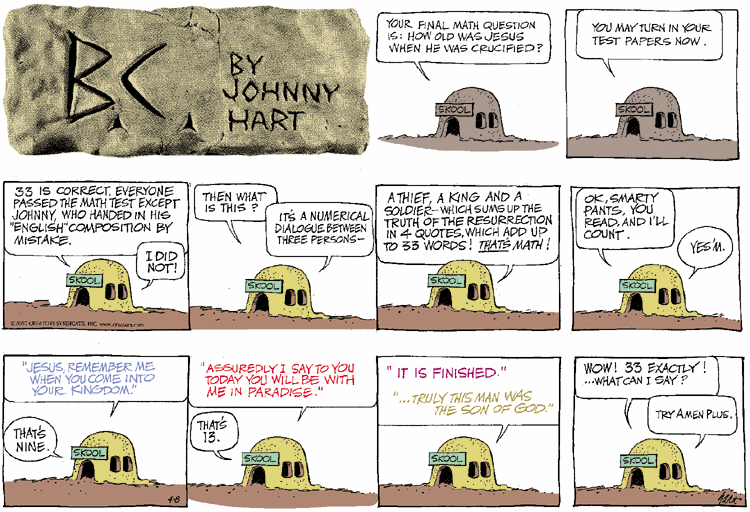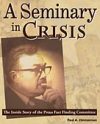Text: John 21:1-14(15-19)
“It is the Lord”
Grace,
mercy, and peace to you from God our Father, and from our Lord and Savior,
Jesus Christ, amen. The text for the
sermon this morning comes from the Gospel which was read earlier.
Just before Lent began a couple
months back, we heard the account of a miraculous catch of fish in Luke 5. Jesus was teaching along the shoreline in Galilee,
and the crowds were pressing Him right into the water; so He asked Peter, the
conveniently nearby fisherman, to take Him out in the boat. Peter was weary from a night of not catching
fish, but he consented anyway. Jesus
taught for a while, and then instructed Peter to row back out into the deep
water and throw the nets in again. Despite the illogic of the instruction, Peter did so-and ended up with a
net-full of fish.
Do you remember Peter’s reaction
when he saw the nets were filled? He
turned to Jesus, terrified, and declared, “Depart
from me, for I am a sinful man, O Lord!” Peter wanted to be far away from Jesus: He had a glimpse of how sinful
he was and how holy Jesus was, and the glimpse of it was terrifying. Peter knew he was a sinner who deserved
judgment, and he was fearful that Christ had come to judge.
Once again
this morning, our text in this season of Easter focuses not on Christ’s death,
but on His resurrected appearances to His disciples and other followers. Blessed assurance was one result of our
Lord’s resurrection appearance to His followers. Christ’s appearances assured His followers
that death is not a closed door but an open door leading to a life far greater
than we could possibly imagine in this life. Even St. Paul proclaimed that “no eye has seen, nor ear
heard, nor the heart of man imagined, what God has prepared for those who love
him.” The resurrection appearances of
Christ gave His followers the wonderful assurance that in the moment we die, in
that very moment, we begin to truly live. Death frees us so that we experience the fulfillment of life in and with
Christ.
It has been
three weeks since the death and resurrection of our Lord and Savior, Jesus
Christ. To date, Jesus has appeared
before His disciples twice. Both times
He appeared, we find the disciples cowering in a locked room for fear of what
happened to Jesus might indeed happen to them as well. It seems that the heat is off of the
disciples. Now, they have gone their
ways and returned to their former occupation: fishermen.
Simon
Peter, Thomas, Nathanael, the sons of Zebedee and two other disciples were all
together. Where the others were, John
doesn’t tell us. Of the seven disciples
who are present, two stand out the most: Thomas and Peter. The last time we saw Thomas, he refused to
believe that Christ was raised unless he saw Him and touched His wounds. Simon Peter, the spokesmen for the disciples,
was also present. And lest we forget
about Simon Peter, he denied Christ not once, not twice, but three times; a
prime leader and spokesmen.
As the seven are prone to do, they
go fishing. Maybe after all that has
gone recently, fishing might help to take the mind off of everything. After being on the water all night, they come
back ashore with nothing to show for it. Imagine James and John, the sons of Zebedee. Just over three years prior to this, they
were in their boats catching fish. Had
three years made them that rusty? Were
the fish just not biting? When Jesus
called to them from the shore, “Children,
do you have any fish?”, you could sense the disappointment in their
voice. You never wanted to come back to
land and say that you caught nothing, especially after being out all
night. But again, the net is full – big
fish this time, but even so the net doesn’t burst. It’s another miracle; and it’s not because
they fished on the other side of the boat. It’s because the One on the shore spoke His Word and declared to them that they would find fish there. Immediately after the disciples listened to
words of Jesus and followed His instruction, the boat became full of fish. The life of a Christian is no different. Once the Holy Spirit works faith in you, the
miracle happens – salvation.
This
incident of Jesus and the disciples shows to us the importance of being in
Christ.
Apart from
Christ’s command to cast their nets into the sea again, they caught
nothing. Try as they might, they could
not catch any fish. But when Christ
spoke to them, they were not able to bring in all the fish which they had
caught. Apart from Christ, we are unable
to achieve eternal life. There is
nothing that we can say or do to earn eternal life. Only when we are in Christ are we able to
receive eternal life; not because of what we have done, but because of what
Christ has done to us and for us.
What does
all of this have to do with us? This
just sounds like a story of a bunch of fishermen who couldn’t catch
anything. On the contrary, this has
quite a bit to do with us.
Our lives
outside of Christ are nothing, for there is no life outside of Christ. One might try to argue that they have a very
good life outside of Christ. They have a
nice home, several nice cars; in short, the works. Jesus didn’t help them get all of this, they
did it themselves.
The
psalmist writes: “I lift up my eyes to
the hills. From where does my help come? My help comes from the LORD, who made heaven and earth.” All good things come from the Lord. All of our earthly blessings come from the
hand of God, not from our own doing. The
disciples found this to be true when they went fishing.
In order to
experience success on the water, the disciples had to rely on the Lord instead
of relying on themselves. They had to
subject their will to the will of the Savior. Instead of being self-directed, they heeded the words of Christ. It was then that Christ resurrected them from
their failures.
We too are
resurrected from death and into life when we focus not on what it is that we
can do for ourselves, but what Christ did for us – became death for us. He became death for us when He came into this
world in the form of a baby. He grew up
so that He could die for your sins. His
death gave to you and to I the keys to heaven in the form of forgiveness of
sins, life and salvation.
Where does God give forgiveness? In His means of grace. Wherever His Gospel is preached and His Sacraments
administered accordingly, Jesus is there to forgive. The hymn, “Salvation unto Us Has Come” tells
us quite a bit in just the first two lines: “Salvation unto us has come by
God’s free grace and favor.” It has
nothing to do with us. It can’t have
anything to do with us. If it had
anything to do with us, then it would mean nothing.
In the resurrected Savior’s
appearance by the shore, we see Him bringing the resurrection to a broken
relationship. The result was
reconciliation. Peter had denied Christ. Yet when Peter heard that it was Christ,
without hesitation Peter leaped for the shore, for forgiveness came from
Christ.
The resurrected Christ brings about
healing to our broken relationship, broken when death entered into
creation. Christ’s death purged death from
creation and His resurrection bridges the gap between death and the new
creation that is in Him.
Through the resurrection, Christ
brings new life – new life to Himself, but also new life to those that are in
Him. This life is passing away. From it shall come a new heaven and a new
earth. We too will pass from a life of
sin and death to a life where sin and death have been defeated by Christ’s
death and resurrection. All of this is
evident by Christ’s resurrection appearances. These resurrection appearances give us the blessed assurance that death
is swallowed up by eternal life. If that
were not the case, Christ would still be dead, death would have overcome us and
we would spend many years lying in a box in the ground.
You see, Christ is risen from the
dead. And He who died to restore us to
Himself didn’t rise again to abandon us. Despite our sinful reluctance to come into His
presence for forgiveness, He still comes anyway. Thus we give thanks to the Lord for His
coming, for His patience, and for His most persistent mercy. And thankful for His persistence, we rejoice
to confess our sins and draw near to Him. For here, by His means of grace, the present,
risen Lord declares that you are forgiven for all of your sins in the name of
the Father and of the Son and of the Holy Ghost. Amen.
Now the peace of God which passes
all understanding, keep your hearts and minds through faith in Christ
Jesus. Amen.




